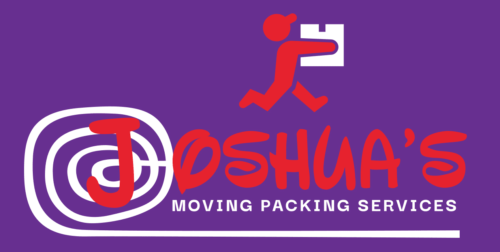The Bay Area can be challenging for DIY movers due to its narrow streets, high traffic, and parking limitations. With professional moving services, however, the experience is often seamless. But given numerous moving services and…

How to Choose the Right Moving Company in the Bay Area
December 20, 2024
The Bay Area can be challenging for DIY movers due to its narrow streets, high traffic, and parking limitations. With professional moving services, however, the experience is often seamless. But given numerous moving services and some scams, how do you find the right one? This guide outlines key steps to finding the right moving company in the Bay Area.
Table of Contents
- Why Choosing the Right Moving Company Matters
- Steps to Find the Right Moving Company
- Unique Insights: Red Flags to Avoid
- FAQs
- Conclusion
Why Choosing the Right Moving Company Matters
Hiring a reliable mover is essential to avoid damaged items, delays, and added stress. Professional movers carefully pack and ship your belongings to protect them from damage. They are experienced in handling fragile and other delicate items, thus guaranteeing their safe move.
Reliable moving service providers turn up on time and work efficiently to avoid delays. These pros know their way around the Bay Area neighborhoods to arrive on time.
Another key importance of professional movers is that they handle everything from packing and loading to shipping and unpacking. Some even offer temporary storage, which gives you peace of mind.
Overall, professional movers understand how to navigate the various challenges that are unique to the Bay Area, such as:
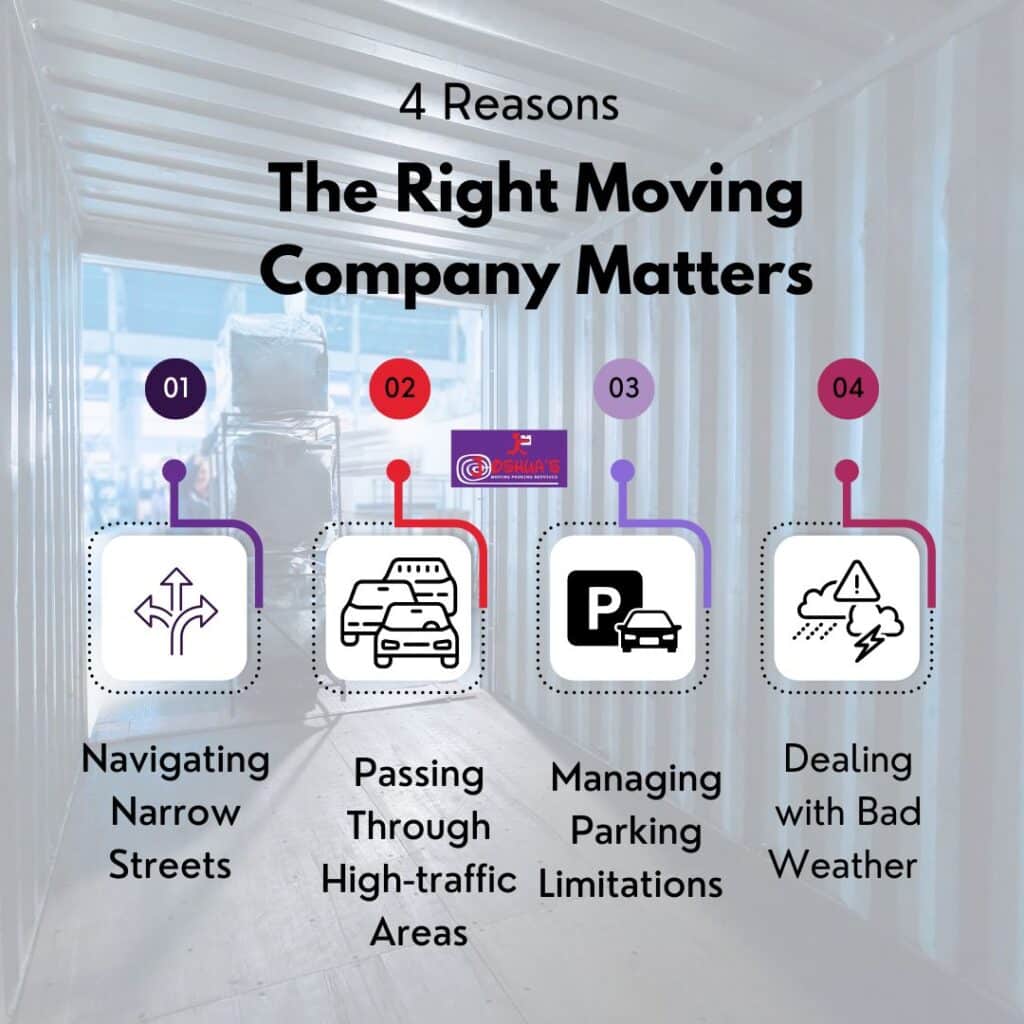
1. Navigating Narrow Streets
Some major roads in the Bay Area, such as Chula Lane, Redfield Alley, and Goldberg Lane in San Francisco, are pretty narrow. They require careful navigation to avoid accidents and are more likely to cause delays.
2. Passing Through High-traffic Areas
Traffic jams are another cause of delays in the Bay Area. In San Francisco, for instance, movers find it challenging to navigate the streets of Market Street and Geary Boulevard because of the heavy traffic during peak hours.
3. Managing Parking Limitations
Most residential neighborhoods in the Bay Area have a 2-hour parking limit for mover trucks and up to 72 hours where there is no signage. Also, you must only park one car away from crosswalks and about 18 inches from the curb. Such restrictions may pose a challenge for less experienced movers.
4. Dealing with Bad Weather
Sometimes, the Bay Area weather can be unpredictable, making moving challenging. You may need to deal with wind storms, heavy rains, and fog, which isn’t easy when you know less about the region or its weather patterns.
Given the above challenges, consider choosing a Bay Area moving company that understands the region. Consider Joshua’s Moving when searching for ‘reliable movers near me’ anywhere in the Bay Area.
Steps to Find the Right Moving Company
Below are five key steps to finding a trustworthy moving company in the Bay Area.
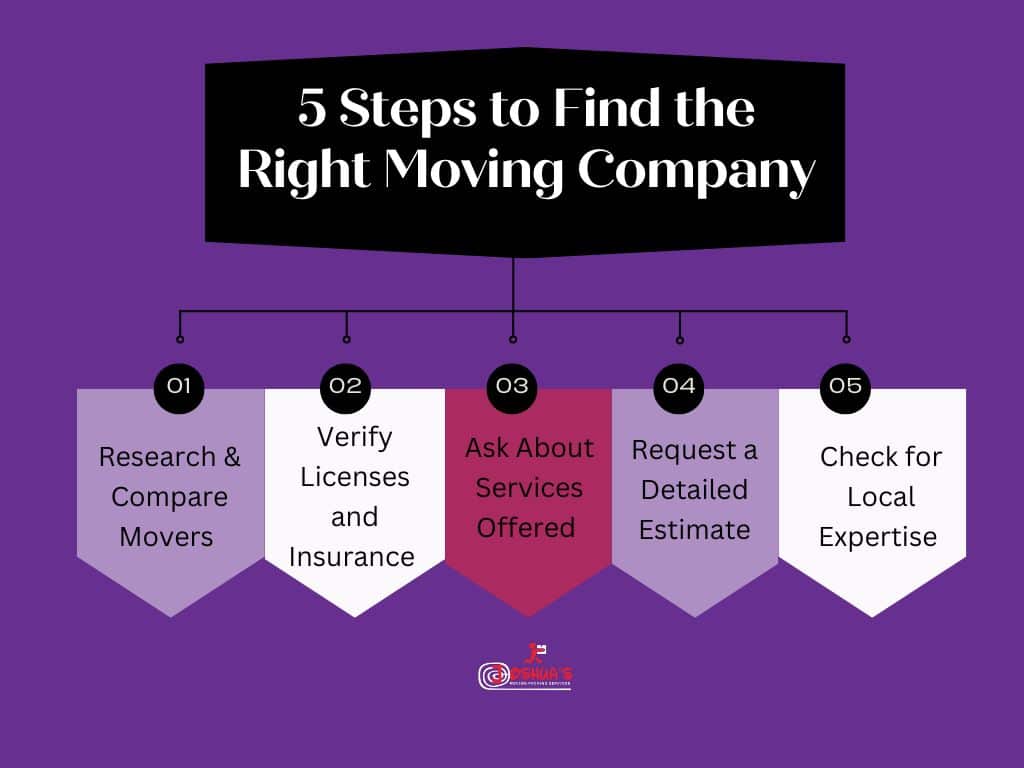
1. Research and Compare Movers
You should do your homework to find the best movers in the Bay Area. You may need to compare several movers before finally settling on one, and you can do it on the following basis.
- Services: Consider the type of services the movers offer to determine if they are what you want. Most movers provide standard services like loading, transportation, and offloading. Others, however, offer packing and unpacking, disassembly, and reassembly. Some offer specialty services for moving delicate and valuable items like antiques and pianos.
- Reviews: You should also compare moving companies based on reviews. What are people saying about the company? You can get the reviews online on Google, Better Business Bureau, or TrustPilot. You can also ask on Quora and Reddit. Consider movers with good reviews and ratings.
- Pricing: Ask about and compare quotes from different movers. Remember that the lowest quotes aren’t always the best and could be a red flag. Compare multiple quotes against the level of service and inquire about hidden fees.
When reading moving company reviews, get customer insights into the company’s professionalism and reliability. Don’t focus too much on a few negative feedback comments but on the overall sentiments. More positive feedback highly indicates you are closer to the right moving company.
2. Verify Licenses and Insurance
It’s necessary to ensure compliance with local regulations when hiring a mover. For that reason, only consider licensed movers. Licensed moving companies have the permission to offer services in the Bay Area and meet industry standards. The licensing also proves work experience, professionalism, and specialized training.
Other than the licensing, the moving company should also be insured. Insurance covers damages and losses while the items are in transit. Note that professional movers don’t offer typical insurance coverage. They offer moving valuation packages, which are protection plans and could be any of these two:
- Released value protection (RVP): RVP is an evaluation that offers limited coverage. It’s not based on the item’s full value but on its weight. This protection is cheaper than the next.
- Full value protection (FVP): RVP is a comprehensive protection plan in which the mover is responsible for the item’s replacement value.
Note that if you need a ‘typical’ insurance coverage, you must obtain it from a third-party company. Most third-party insurance companies offer these two plans:
- Actual cash value coverage: This insurance policy considers the item’s depreciating value.
- Full-replacement value coverage: This policy covers the cost of replacing the item. It’s almost similar to FVP.
But how about moving company verification?
Regarding license verification, consider checking it with the Bureau of Household Goods & Services or the Federal Motor Carrier Safety Administration and enter the mover’s DOT number or name. FMCSA registers all commercial motor vehicle haulers. Also, consider the Better Business Bureau, where you can verify the mover’s accreditation.
As for insured movers in Bay Area verification, ask about the protection plan and insurance directly. The mover should inform you if they offer any protection plan.
3. Ask About Services Offered
Inquire about the services that the mover offers. If you intend to move house, you may need to consider residential movers. In contrast, consider commercial movers if you are moving offices. Full-service movers will provide the following service options in both cases:
- Packing and unpacking
- Loading and unloading
- Furniture disassembly and reassembly
- Transportation
- Temporary storage
- Disposal services
Don’t forget about specialty services for items that require special handling. These items require unique packing and storage options; some may need separate transportation. Because of the extra attention, they are slightly costly to move. However, it’s worth it as you avoid any risk of damage. Professional movers know how to handle such items and will take care of everything.
Examples of items that specialty moving services handle include:
- Antique and other collectibles
- Expensive furniture
- Vehicles
- Bulky household items like fridges, dryers, and chest freezers
- Commercial equipment like spa and barbershop equipment
- Super-heavy fixtures like a hot tub, pool table, and aquarium
4. Request a Detailed Estimate
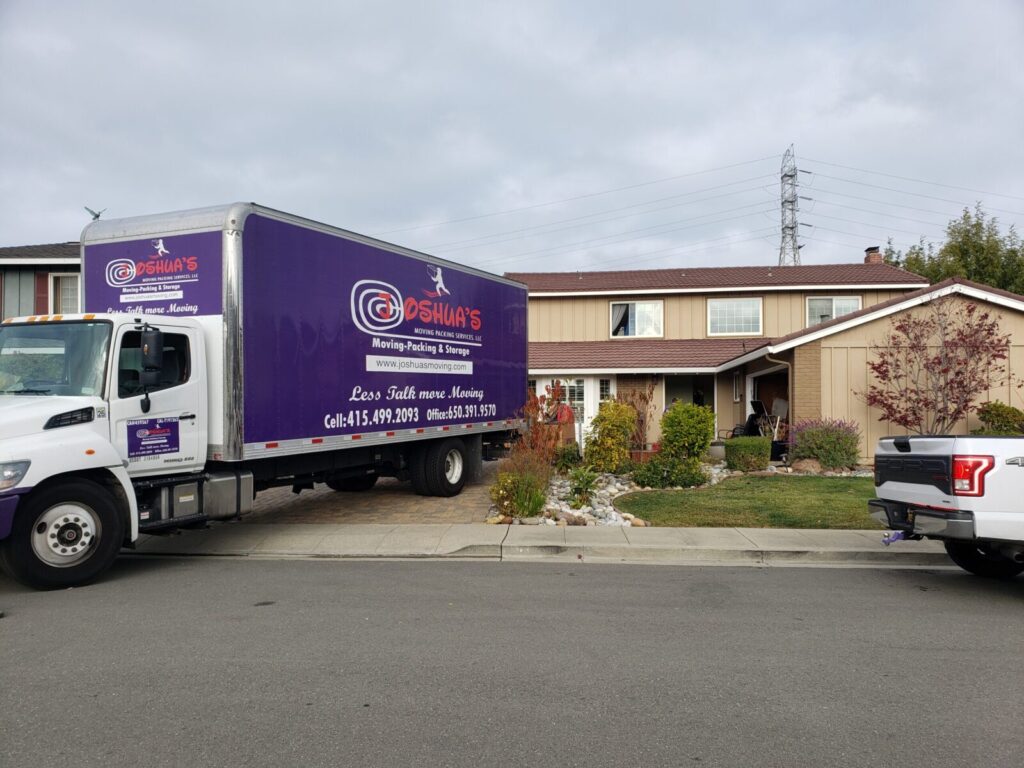
With many moving companies having hidden charges that mess up the client’s budget, ask for detailed, transparent moving quotes. Ideally, you can opt for any of these two estimates, depending on the evaluation method:
- In-home estimate: In this case, the mover visits you at home to determine what needs moving and then comes up with an estimate. It’s accurate as it involves thorough assessments. However, it can be time-consuming as someone has to be at home during the evaluation, and it may take time before the movers arrive.
- Virtual estimate: Virtual estimates happen over a video survey. The mover doesn’t come to you, but you walk them through your house via video, explaining what needs moving. The danger is that you could easily skip a critical item that needs moving.
In either case, ask for a written, itemized quotation because it gives you a detailed breakdown of all moving costs. Since it’s in writing, you can refer to it when comparing multiple quotes.
An itemized quote allows you to ask questions and avoid surprise costs. You can tell from the very first if the estimate meets your budget. It also lets you know the level of service to expect, as everything is clearly outlined. More importantly, it allows you to hold the mover accountable if the service is below par.
Binding Vs Nonbinding Estimate
It is essential to confirm whether the moving cost estimate in the Bay Area is binding or not. A binding quote doesn’t change. You only pay the estimated amount. The downside is that it denies you the opportunity to enjoy discounts if the moving costs less.
A non-binding estimate, on the other hand, may change. You may pay more or less depending on the final cost of moving. A binding estimate is the better option to avoid hidden moving costs.
Here are quick steps to asking for an in-home or virtual estimate:
- Schedule an appointment with your preferred mover
- If it’s a virtual survey, wait to receive the meeting ID
- Connect with the mover via video and take them through the items you want to move
- Review your inventory list to ensure everything is accounted for
- Wait to receive an estimate from the mover
5. Check for Local Expertise
Consider hiring experienced local movers. Local moving company benefits are vast. Movers with local knowledge are familiar with the Bay Area’s moving regulations and thus promise compliance. They are also familiar with the traffic patterns and regional routes and can navigate the challenges to avoid delays.
Given the Bay Area’s unpredictable weather pattern, local moving experts know what to do when Mother Nature turns. Even better, their estimates are more accurate, as they know the region well. Bay Area moving experts streamline the moving process to ensure everything runs smoothly and efficiently.
Unique Insights: Red Flags to Avoid
Below are red flags in moving companies you should be wary of:
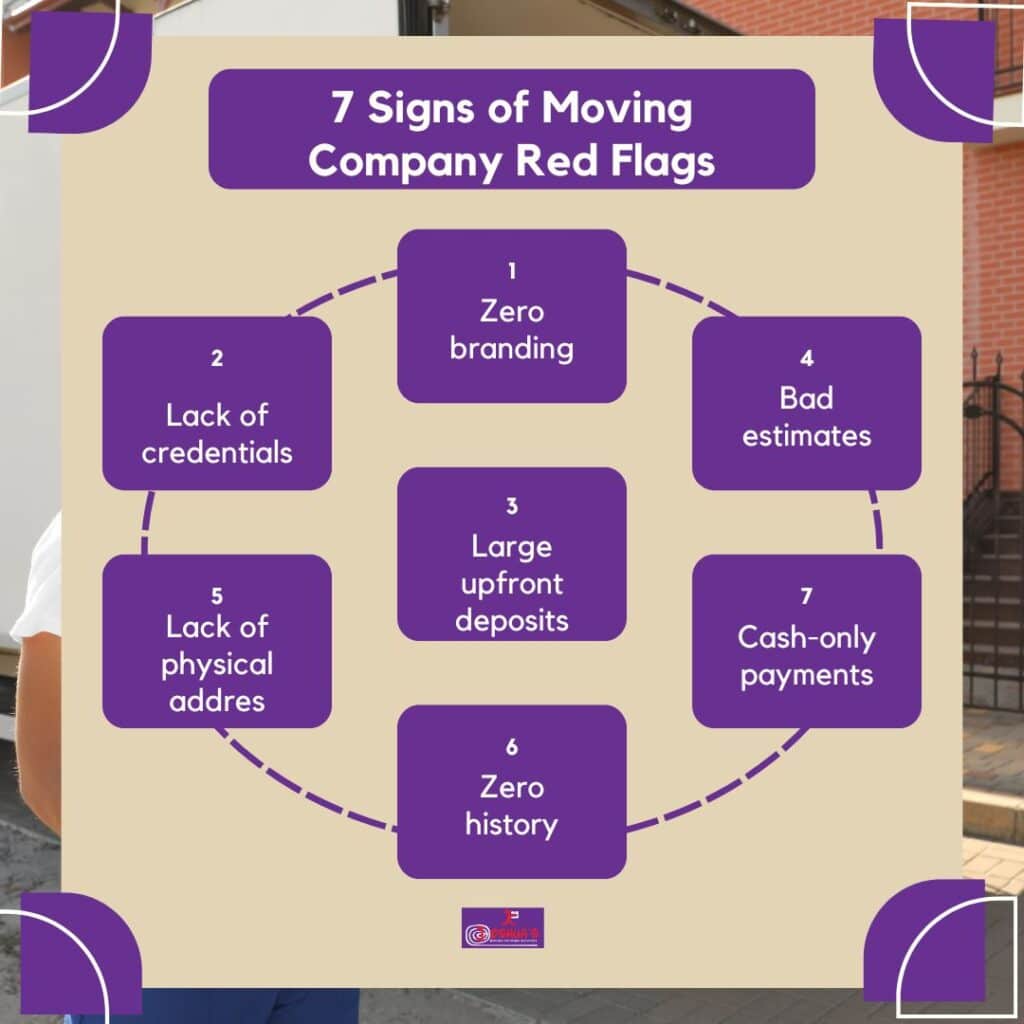
- Zero branding: Avoid movers with unmarked trucks – no logo, address, or contact information. Also, avoid moving services with no online or offline presence and the staff having no identifiable work attire (uniform).
- Lack of credentials: A moving company is likely a scam if it lacks insurance, licensing, and a local permit.
- Large upfront deposits: The upfront fee should be reasonable, about 20-30% of the total amount. If they ask more than 50%, they are likely questionable.
- Bad estimates: The company should offer detailed, itemized quotes. They shouldn’t provide the estimates without an in-person or virtual survey.
- Lack of physical address: If the mover does not have a physical office or storage facility, they are likely unreliable.
- Zero history: Avoid companies with no history, customer feedback, or referees.
- Cash-only payments: It is a red flag if the mover insists on cash-only payments. It could show they don’t want to leave a trail. They should offer multiple payment methods.
Now that you know how to spot unreliable movers, here are additional tips for verifying their credentials and checking complaints records:
- Check their PUC licensing number at the bottom of the homepage and verify it with the California Public Utilities Commission
- Avoid moving scams by checking company registration with the Federal Motor Carrier Safety Administration (FMCSA)
- Ask for references
- Ask for free estimates – the FMCSA requires movers to do that
- Check out complaints on the BBB website
- Check them out on consumer protection sites like ProtectYourMove.gov or MovingScam.com.
FAQs
Q: How far in advance should I book a moving company in the Bay Area?
Consider booking a moving company at least 4-6 weeks earlier. In the summer, in particular, book movers in advance, as they are in high demand because kids are on break, most parents are on vacation, and the weather is conducive. If you are looking for a moving timeline that’s less busy, consider October through March.
Q: What questions should I ask a moving company before hiring them?
Examples of questions for moving companies that may serve as a pre-hire moving checklist include:
- Are you registered?
- What’s your USDot registration number?
- Do you offer insurance?
- How long have you been in business?
- Are there any other charges?
- Are you a carrier or broker?
- How much will it cost me?
Q3: Are Bay Area movers more expensive?
Due to a higher cost of living, moving to the Bay Area may be more expensive than in most regions. However, the Bay Area moving costs depend on several factors. One is distance, where local moves are cheaper than interstate moves. The other determining factor is the season. Expect affordable movers off-season (October to March) and pay more in the summer. Other factors dictating the moving cost include the size of the move and services.
Conclusion
Are you looking for the right moving company in the Bay Area? Talk to Joshua’s Moving about your moving needs. Our team is experienced in offering residential, office, and specialty moving services. Contact Joshua’s Moving today for a free estimate!
